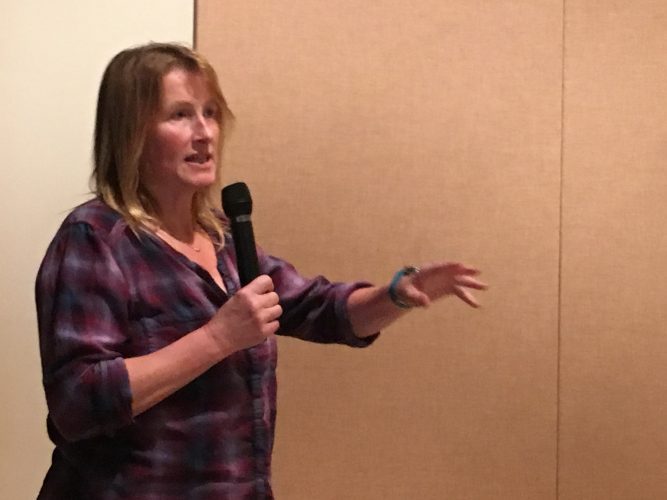
Lynn Prysunka is a doctor at Wrangell Medical Center and SEARHC. She spoke in front of a crowd of about 100 at the Nolan Center on April 9, 2018 (June Leffler/ KSTK)
As rural hospitals struggle and even shutter their doors, more are looking to partner with larger health organizations to remain afloat. Wrangell’s municipally operated hospital is doing just that. The Southeast Alaska Regional Health Consortium announced their plan to acquire Wrangell’s hospital and build a new one. The city is embracing this change, saying the existing hospital is falling apart and struggling financially.
Jim DeBord has lived in Wrangell for three years, working as an occupational therapist. He worries about his job, because of the hospital’s finances.
“There have been nights I’ve literally lost sleep,” he says.
He’s married and has a baby. His family does not want to have to move from Wrangell.
“I value my job, but I also value the ability to take my child to the emergency room, and we don’t want to lose that.”
At a public meeting, SEARHC said the Native non-profit would build and operate a new hospital on the land surrounding the current SEARHC clinic.
Dan Neumeister is the senior vice president for SEARHC. He assured the crowd that the new hospital would offer all the current services offered at existing facility. And that SEARHC would take over the liability of the existing hospital until the new one is up and running.
“We very supportive of taking over the financial responsibility of your hospital.”
The plan is pending architects’ designs and a liability estimate. But both parties know what they are getting into, and are ready to move forward. The acquisition could finalize as early as mid-May. It would take up to 3 years to construct the facility.
The city says the offer could not have come any sooner, because the 50-year-old hospital is structurally and financially falling apart.
There are electrical, roofing and plumbing problems. The foundation is sinking into the ground.
Josh Ripplinger is one of the architects designing the new hospital.
“There are areas where you’re one break away from having to stop services temporarily until you fix it,” says Josh Ripplinger, one of the architects that visited Wrangell this past weekend.
The city received an estimate for a new hospital at about $50 million. City Manager Lisa Von Bargen says that’s too high of a price tag.
“It’s just not something we should do,” she says.
Plus, the hospital is not making enough money to sustain operations. At its best, it has about 30 days operating reserve available to pay for services and salaries. In the fall, that reserve dropped so low the city wrote a last minute line of credit for $250,000 to keep the hospital going.
The hospital’s CEO, Robert Rang, attributes this struggle to state funding cuts. The state reimburses the hospital for less than it costs to pay for patients on Medicaid. And Wrangell’s patients are predominately on public insurance.
“We are losing money, we’re past hemorrhaging,” Rang says. “Financially we can’t go much longer.”
Of the almost hundred Wrangell residents in attendance, those that spoke expressed their gratitude for SEARHC’s offer.
Christie Jamieson says the town’s economy could tank if the hospital were gone.
“Can you imagine not having a hospital and losing all those employees and their families?” she asked.
It employs over 60 full-time workers, who own houses and shop locally. She likens a hospital closure to when the sawmill went away.
“I don’t even want to think about that.”
Rural hospitals across the nation are feeling the same pressure. Eighty of these critical access hospitals in the U.S. have closed since 2010.
Neumeister says Southeast is no different.
“The impact that you’re seeing to Wrangell Medical Center is the same impact that Petersburg is seeing, that Sitka Community Hospital is seeing,” Neumeister says. “Just about every small hospital in the United States is having significant problems.”
If SEARHC and the city sign a deal, the city would no longer be liable for healthcare in Wrangell. Instead a local board of representatives would act in an advisory role.
SEARHC acquired the local native clinic, Alaska Island Community Services, last year. There were concerns that services and jobs would be cut. But AICS founder and former CEO Mark Walker says the transition was smooth.
“And they were true to their word with every single person I am aware of,” he says.
SEARHC says there would be no layoffs.
Architects will come back to the city and SEARHC with hospital designs in the next few weeks. It would take two and a half to three years to build the hospital.











